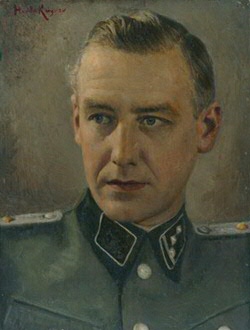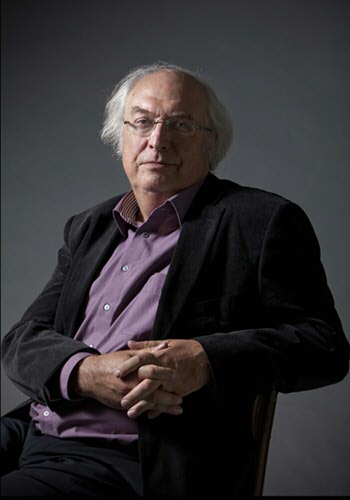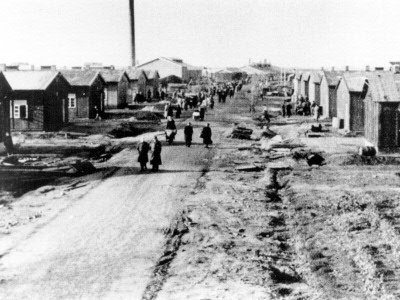The tracks of a camp commander

From Westerbork camp they left, facing death: trains filled with Jewish children, women and men, on their way to Auschwitz, Sobibor or Theresienstadt. One train with 1,000 to 3,000 people on it every Tuesday. The person responsible: camp commander Albert Gemmeker. The same Gemmeker who was known as a decent man and was released after six years of imprisonment. Journalist and TV producer Ad van Liempt describes in his biography how this charming yet evil man got away with his actions, but lived in fear of new punishment every day for years in Germany.
Text: Eelco Salverda, Communication UG
‘A fascinating story.’ Van Liempt often uses these words when talking about the biography for which he will gain a PhD degree. For two full hours, he shares anecdotes, descriptions and contemplations. He is so captivated by his subject that he talks virtually non-stop. Albert Gemmeker, the man who arranged for the 'smooth' transport of 80,000 Jews, Roma and Sinti out of Westerbork from the end of 1942.
Death penalty
Ten years; that was the mild sentence that Gemmeker received after the war. He was released after only six years for good behaviour. It seems a ridiculously short time. Van Liempt: ‘He always denied that he knew the fate that awaited the Jews. In addition, in its sentence request, the Public Prosecutor’s Office in Assen took into account that he had behaved relatively decently and had been indoctrinated by the Nazi system. The latter argument was never used in trials in Amsterdam, where I think he would have received the death penalty.’ Van Liempt explains that Gemmeker operated somewhat on the periphery, both geographically and organizationally. ‘His guilt was not immediately obvious. People were unfamiliar with the notion of a bureaucratic killer. Those who had been demonstrably brutal were punished relatively more severely.’

The life of a king
Born into a poor family, Gemmeker worked his way up the Nazi hierarchy as a policeman and an SS member. Quite unexpectedly, he became the commander of Westerbork. ‘He had everything there: unlimited power, facilities, a mistress’, lists Van Liempt. ‘He wanted to stay in the camp. That is probably why he had a film made there; to show his superiors how well he had organized things.’ As a convict, he worked in the Limburg mines for some time after the war, where he received a decent wage, intended to support his family. ‘Yet, he never paid a penny to his divorced wife and their children,’ says Van Liempt. Once a free man, Gemmeker started selling cigars in Düsseldorf, Germany. ‘The story goes that some of his victims bought their cigarettes there to have him serve them by way of compensation.’ Together with his third wife, he lived a frugal life in a small apartment with a collapsible sofa bed. He died lonely in 1982.
Rabid about rules
Imagine this: it is two days before Christmas, 1943. A Jewish girl and a military police officer from Drenthe, who is part of camp security, meet in secret at the camp gate. She brings him a small birthday present: a packet of hand-rolling tobacco. Suddenly, they find themselves in the floodlight, operated by Gemmeker himself. Due to the incident, the girl, Lotte Weisz, ended up in the penal barracks and was deported a few weeks later. This is the opening scene of the biography. ‘He was rabid about following the rules,’ Van Liempt explains his decision to open with this anecdote. ‘I want to correct the image that he was a decent man. He had people deported over trifles. He was cold and ruthless. He was obsessed with order; he could go berserk after an attempted escape. No, he would not hit people; the trains were his weapons.’
Torn-out photographs
By the end of the war, Gemmeker gave the order to destroy documents. This was part of a larger attempt to cover his tracks. After his release, he visited his ex-wife and children, just to tear photographs out of an album. ‘He continued to launder his reputation’, says Van Liempt. ‘As one of his daughters aptly puts it: “He left nothing behind, just us”.’ During an attempt at denazification, Gemmeker asserted in Germany that he had been a policeman in the Netherlands, without even mentioning Westerbork. And although there is an account of him meeting Eichmann about the persecution of the Jews, he simply denied ever having attended such a meeting. ‘The lying alone makes it implausible to me that he knew nothing about the fate of the Jews,’ says Van Liempt.

Seventeen-year investigation in Germany
Was Van Liempt’s research driven by a sense of justice? ‘No, rather by annoyance’, he says. ‘I was surprised to find that so little was known about him. So I thought: “I’ll just do it myself, then”.’ Van Liempt’s search began with reading. Books by historians such as De Jong and Presser, as well as the Westerbork diaries by journalist Philip Mechanicus, a camp prisoner, led him to interrogation reports, testimonies and letters. His search ended with Gemmeker’s two daughters and the German investigating judge Steffen, for Van Liempt discovered that Gemmeker had been the subject of a preliminary judicial investigation in Germany for 17 years.
‘His fear is our consolation’
‘In the Netherlands, we barely knew about this German investigation into Gemmeker, which lasted until 1976,’ explains Van Liempt. ‘Ultimately, he was not prosecuted because they too were unable to prove that he knew more. I've spoken with investigating judge Steffen. He was convinced that Gemmeker was lying, but ultimately, his case wasn’t brought to court. What deeply puzzles me, though, is that this decision was made by a public prosecutor who, years before, had issued a negative advice about investigating Gemmeker at all. A procedural blunder!’ For Gemmeker, however, the investigation always felt like a sword of Damocles, says van Liempt. ‘One of his daughters said: “Our father lived in fear of new punishment for seventeen years. That is our greatest consolation”.’

The readers must decide
Writing a biography implies being complete, which would include mentioning the positive aspects. Was it difficult for you to include those aspects? ‘Well, it was difficult to find any. Even his children and grandchild only have unpleasant memories of him. It may sound cynical, but in a sense he was the ideal implementer of the deportations, in that his story shows the potential consequences of giving unlimited power to people who are obsessed with order and sensitive to authority.’ Van Liempt claims to have remained objective in his descriptions. ‘I don’t want to judge too much, and I certainly don’t want to speculate. The readers must be allowed to decide for themselves.’ To Van Liempt, however, it is clear: it is very unlikely that the commander did not know that he was sealing the fate of the deported Jews.
Intense experience
The interviews with two of Gemmeker’s daughters and one granddaughter were intense experiences for both parties. ‘One daughter told me that she sometimes suddenly recognizes, in herself, certain qualities of her father. She hates that. There is so much shame. They had never spoken with anyone about their father, and I told them things that they didn’t know yet. It has aroused strong feelings. Since we met, one granddaughter has started visiting schools to talk about the war. Van Liempt even dreamt about the research, he admits: ‘You become almost obsessed with this man.’ It is a good thing that the project is finished now. ‘It’s important to round things off. Also, to paraphrase my fellow biographer Annejet van der Zijl, I'm glad to chase that man out of my office.’
| Last modified: | 11 May 2020 4.17 p.m. |
More news
-
12 March 2025
Breaking news: local journalism is alive
Local journalism is alive, still plays an important role in our lives and definitely has a future. In fact, local journalism can play a more crucial role than ever in creating our sense of community. But for that to happen, journalists will have to...
-
11 March 2025
Student challenge: Starting Stories
The Challenge Starting Stories dares you to think about the beginning of recent novels for ten days.
-
11 March 2025
New: Sketch Engine, tool for language research
Sketch Engine is a tool for language research, which can also be used for text analysis or text mining.
